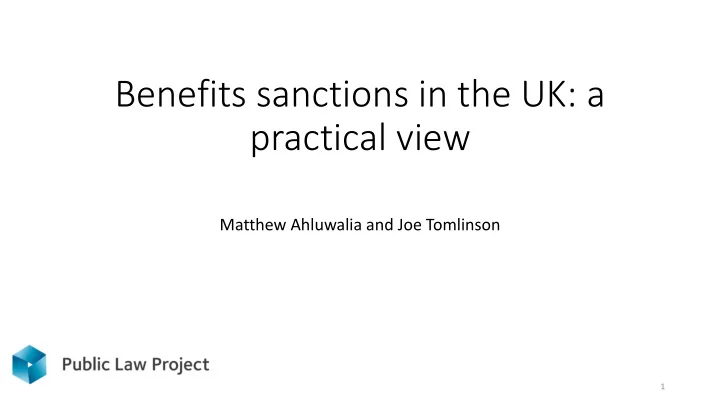

Benefits sanctions in the UK: a practical view Matthew Ahluwalia and Joe Tomlinson 1
About the Public Law Project • National legal charity • Access to justice, rule of law, quality of decision-making • Benefits sanctions as key focus area 2
After Judicial Review: Benefit Sanctions, Illegality & Administrative Justice • This paper will explore the issues that benefits claimants and their advisers encounter at various stages in the life-cycle of a claim and a decision to sanction. • It will also highlight certain categories of claimant that may be particularly likely to be sanctioned, or who may be especially vulnerable if their income is reduced. 3
Four stages where unfairness may arise • Initial decision about benefit entitlement • Imposition of requirements through a ‘claimant commitment’ • Alleged non-compliance with a requirement • Remedies that may be available once a sanction has been imposed 4
The growth of sanctions • As of May 2017, 1.8 million (inc. Universal Credit, JSA, ESA, Income Support) • 8% of JSA claimants in 2013 • In August 2017, 6.7% of Universal Credit claimants 5
Potential errors of law • Failure to take into account the circumstances of sick and disabled claimants in the ‘claimant commitment’ • Failure to provide information to claimants about adjustments which they are entitled to request • Failure to take account of caring responsibilities in the claimant commitment • Failure to notify an appealable decision • Refusal to accept a request for a late revision • Failure properly to notify a claimant of work-related requirements. 6
R(Reilly and Wilson) v SSWP [2013] UKSC 68 • Jobseeker’s Allowance (Employment, Skills and Enterprise Scheme) Regulations 2011, under which several back-to-work schemes were created, were made under s 17A Jobseeker’s Act 1995 • Claimants challenged the Regs on four grounds: i. the regulations were ultra vires s 17A for failing to provide the prescribed details of the schemes; ii. the DWP failed to meet the notice requirements in regulation 4 by not giving them sufficient information about the schemes iii. the Government must set out details of the schemes in a published policy; and iv. the schemes constitute forced or compulsory labour contrary to the ECHR, art 4. 7
R(Reilly and Wilson) v SSWP [2013] UKSC 68 • Supreme Court held that the 2011 Regulations did not comply with the requirements of s 17A because they did not contain a sufficient “prescribed description” of the schemes. • The notice served on Mr Wilson was insufficient because it only informed him that he was required to perform “any activities” requested of him by the company operating the scheme, without giving him any further details. The notice was therefore invalid. • Fairness requires a claimant to have sufficient information about the schemes to make meaningful representations on their own behalf before a decision is made. • The 2011 Regulations did not violate Art. 4 ECHR. 8
Mandatory reconsideration • Low rate of decisions being overturned • Inconsistent turnaround times • Significant drop in number of appeals lodged with Tribunal • ‘Rubber stamping’ • Claimant fatigue 9
Role for online tribunals? • Tracking your appeal • Online dispute resolution • ‘Continuous online hearings’ 10
Why aren’t there more judicial review cases about sanctions? • Claimants’ awareness of legal rights • Availability of early legal advice • Legal aid 11
Getting in touch with us sanctions@publiclawproject.org.uk 12
Recommend
More recommend